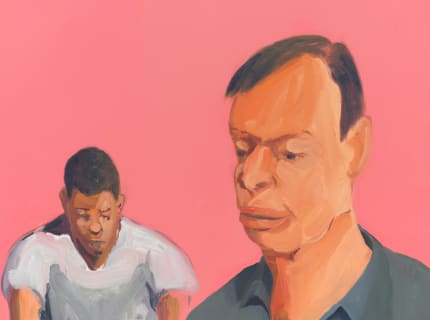Susannah Darrow: So, you’re from Detroit. What impact did the Detroit Institute of Arts [DIA] have on your development as an artist growing up there?
Steve Locke: It gave me the understanding that art was something I could do, that this is a job some people have. Every school kid in Detroit goes through that museum. For an eight or nine-year-old kid, having access to those things is huge. That was my neighborhood museum.
Darrow: What do you think about the possible deaccessioning of DIA’s collection?
Locke: It’s disgusting. I know there are many layers and it’s complicated. On one side are the people who love that museum, who gave themselves a tax increase to fund it. On the other side, you have all of these bankers who want to get paid. We know from Marx that capital is only concerned with itself. It’s not concerned with people and places. This whole community of artists is completely outraged about what’s going on, and then you have one of the top auction houses [Christie’s] actually evaluating the collection.
That it’s even worthy of a discussion is hugely problematic. There’s a lack of vision and there’s a lack of value. For them, the museum only has one kind of value and that value is monetary. That’s the side you keep hearing about. You don’t hear about the values that artists like Mike Kelley, Carrie Moyer and me—all these people who come from Detroit—that that collection figured prominently in all of our developments.
Darrow: You have a very rigorous studio practice and it very much is your profession. You’ve said it’s your “job” when you go to the studio. Can you talk about the process and role of your studio in your practice as an artist?
Locke: There are two parts of it: the studio as a place and the studio as a way of thinking. Over the past 10 years, my studio was always in my home. So, I could roll out of bed and make a painting. I recently got a studio at the Boston Center for the Arts, so not having my studio in my home really does make it feel like I’m going to work, like I’m going to suit up and drive down to the office, punch in and punch out. That feels nice, actually.
I try to be in the studio every day. Even if I just go to eat my lunch and then go home. I deal with my students all day, so on my way home I go to my studio and think about my work after dealing with theirs all day. You know, you tell students stuff and then you think, “oh man, I should probably do that myself.” [Laughs] So that’s a way of staying honest.
Darrow: Are you more disciplined about how you work now?
Locke: I’m a control freak, so I don’t think it’s possible for me to be more disciplined. But, the separation now is really interesting to me. There are things that I do at home that I have to figure out how to do when I get to the studio. So I have this wacky drawing practice at home now that’s not as complex as in my studio, and on my blog I started using drawings I find in my studio, drawings that explain things. It’s just a very different way of working. What I do in my home now is nothing like the work I do in my actual studio. My studio is no longer a place where I live and work. It’s a place where I work and it’s very hard to leave.
...
Read full interview at burnaway.org.

